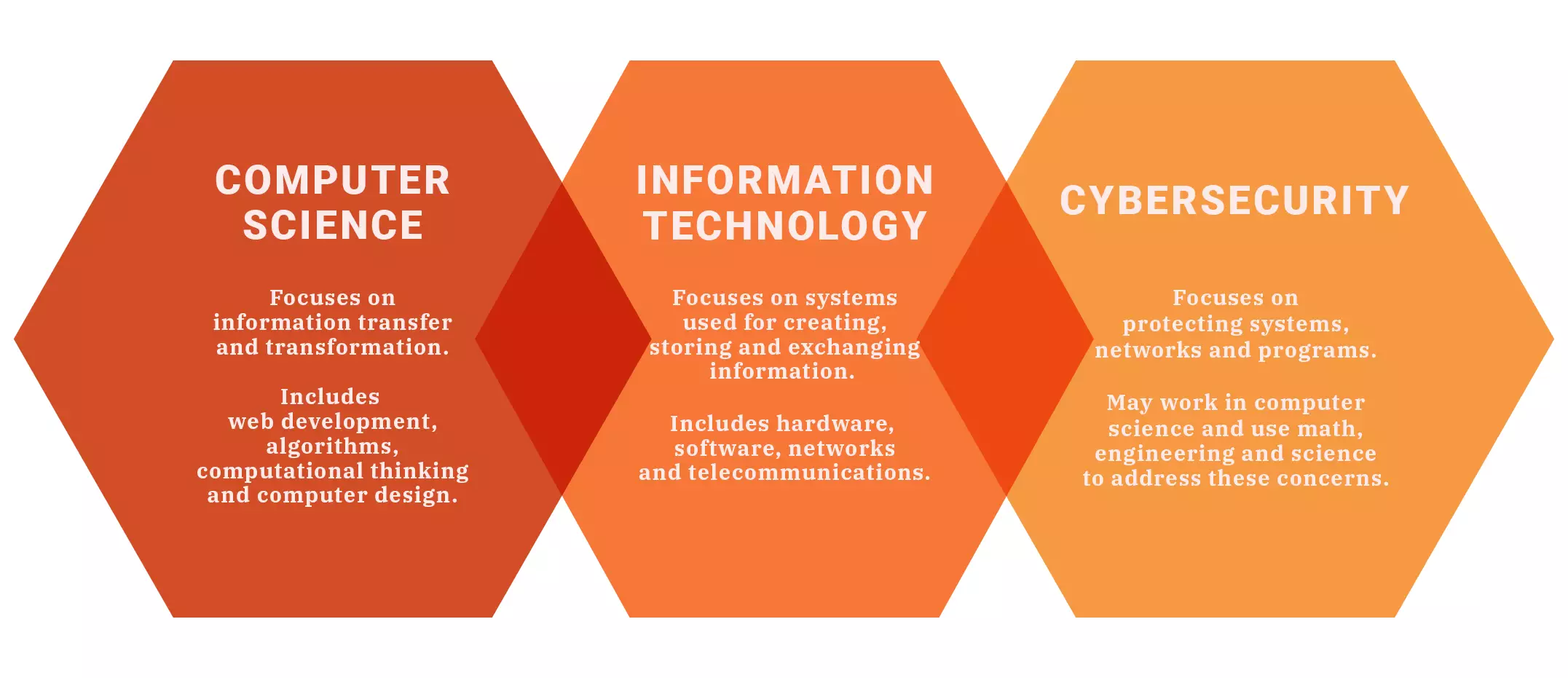Articles > Information Technology > Comparing computer science, cybersecurity and IT
Comparing computer science, cybersecurity and IT
This article was updated on April 4, 2024.

Written by Michael Feder

Reviewed by Kathryn Uhles, MIS, MSP, Dean, College of Business and IT

Technology is a constant in many people’s lives. Whether during leisure time or at work, people interact with countless computer applications every day. It takes dedicated work from numerous professionals in computer science, cybersecurity and IT to create these applications before they get to consumers — and to keep them running smoothly. Let’s take a closer look at each of these areas of study.
Where do computer science, cybersecurity and IT overlap and differ?Â
Computer science, cybersecurity, and IT are three closely related fields that power modern digital systems—but they each serve distinct purposes. Students and professionals can identify the optimal path for their interests and career goals by understanding how these areas overlap and differ.
What is computer science?Â
Computer science combines multiple disciplines, such as the study of algorithms, data structures, web development, computational thinking, abstraction of information and the design of computers. It’s the study of information transfer and transformation.
Computer science intersects with disciplines like math, engineering and even psychology. In addition, it offers a broad range of subdisciplines, like artificial intelligence (AI), database systems, security, human-computer interactions and graphics.
Why is computer science important? It plays a pivotal role in driving tech innovation. It’s the engine that powers technology breakthroughs and advancements, including:
- Machine learning
- Data science
- Robotics
- Software development
Computer science is prevalent in various sectors of society, from healthcare and entertainment to finance and manufacturing. Computer science is used to create systems to handle vast amounts of data, solve complex problems and improve process efficiency.
At its core, computer science shapes technology’s future and the ways people interact with it.
Computer science education and certificatesÂ
A Bachelor of Science in Computer Science (BSCS) focuses on information technology hardware and software. Those who complete a degree in computer science, once in a role geared to their special training, may focus on programming. They may also conduct testing, which means they simulate various issues that might arise in real life to see if the device or program processes the request or solves the issue and continues to function normally.
In addition to a bachelor’s degree, computer science professionals can pursue certificates in specific areas like cloud computing or programming languages to fine-tune their expertise.
Careers in computer scienceÂ
Careers in computer science are available in various industries, especially as the tech industry continues to grow. A BSCS can prepare you for several different roles in the industry, including:
- Computer support specialists provide expert assistance that helps organizations troubleshoot their problems. They also help install new hardware and maintain current computer systems. Computer consultants sometimes have different titles, like computer consultants While education requirements for this role can vary, high-level consultants often have a bachelor’s degree. As of May 2024, computer support specialists earned , according to U.S. Bureau of Labor Statistics (BLS.)
The salary ranges are not specific to students or graduates of °®¶ą´«Ă˝. Actual outcomes vary based on multiple factors, including prior work experience, geographic location, and other factors specific to the individual. °®¶ą´«Ă˝ does not guarantee employment, salary level, or career advancement. BLS data is not geographically based. Information for a specific state/city can be researched on the BLS website.
- Computer system analyst: Computer system analysts are sometimes called IT analysts. They study an organization’s existing IT infrastructure (computer systems and procedures) and design appropriate improvements. This helps the organization function more efficiently. As of May 2024, software developers earned between , according to BLS.
- Software developer: Ever wonder who creates the apps on computers? It’s software developers. They design, code, test and maintain computer programs to meet user needs. As of May 2022, BLS reported these professionals earned between , according to BLS.
- Application developer: Application developers can design computer software or applications for web platforms, but the job title tends to focus on mobile device applications. App developers write code in various programming languages and test it for efficacy. They work in multiple sectors, including business, entertainment and education. They also have a similar salary track to software developers.Â
What is cybersecurity?
Cybersecurity, and its subset, information security, is how people and companies protect their systems, networks and programs from digital attacks. Cyberattacks typically target sensitive information to access, change or destroy it. It’s a major tactic for extortion and interrupting business.
Cybersecurity is an extremely important field as more businesses move their infrastructure online.  For example, the healthcare industry alone experienced more than 100 data breaches in just the first few months of 2024. But businesses aren’t the only entities that need to worry about it. Private individuals and public organizations must also secure their data and information. That’s where cybersecurity professionals come in.
Cybersecurity education and certificates
In addition to bachelor’s programs, cybersecurity professionals can pursue certificates to expand their knowledge on specific topics. These can include certificates in cybersecurity, network defense, and information assurance.
Careers in cybersecurityÂ
Careers in cybersecurity allow professionals to apply their backgrounds in mathematics, science and engineering to solve cyber issues. They also prevent unauthorized access by individuals, state actors and those who seek to disrupt, exploit or otherwise wreak havoc.
One job title in cybersecurity is network or information security analyst. As of May 2024, information security analysts , according to BLS.
BLS also reports information security specialist positions typically require a bachelor’s degree in a computer-related field and real-world work experience.
A cybersecurity expert may also work in a computer science field to assist teams with security precautions and analyses of new products for security flaws and other problems.
In addition to information security analyst jobs, a cybersecurity degree program can help prepare graduates for work in other tech roles, such as IT specialists and systems analysts.
What is information technology?Â
Information technology (IT) is the broad term that can include computer science, cybersecurity and IT, and refers to the systems that people develop to create, store, exchange and use information. This can include hardware, software, networks and telecommunications.
Information technology also explores how people use computers, mobile devices and the internet to store, retrieve, transmit and manipulate data.
Given IT’s broad scope, it is essential to modern life and touches sectors ranging from business and education to healthcare and entertainment.
IT education and certificatesÂ
There are multiple degree pathways to enter the IT field, including a Bachelor of Science in Information Technology. Other potential options include a Bachelor or Master of Science in Information Technology.Â
For those who want to expand their expertise, there are competency-based degrees for professionals who have significant work experience and industry knowledge. Competency-based degree programs enable self-motivated and disciplined students to move through learning at a self-governed pace and work with a faculty member as needed. This is a good opportunity for those who want to complete their degrees faster.
For graduates who already have a degree in IT, certificate programs can augment education and help expand knowledge in a specific area. Certificates can be assets to showcase on a resumé.
Careers in information technologyÂ
When choosing between computer science, cybersecurity and IT careers, consider this: For anyone thinking about entering the IT world and exploring careers in information technology, it’s worth noting that overall employment in computer and information technology occupations is projected to . About 356,700 openings are projected each year, on average, according to BLS.
Information technology jobs are constantly evolving, but a bachelor’s degree in information technology can help prepare candidates for a role as an information systems manager or director.
BLS Occupational Employment Projections, 2023-2033 is published by the U.S. Bureau of Labor Statistics. This data reflects BLS’ projections of national (not local) conditions. These data points are not specific to °®¶ą´«Ă˝ students or graduates.
 and directors usually plan, coordinate and direct their organizations’ computer-related activities. Most of their work involves looking at the existing computer needs and recommending upgrades, but it can also involve ensuring security among IT programs. To become an IT systems manager, a bachelor’s degree in a relevant field is typically sought after. As of May 2024, computer and information systems managers , according to BLS.

Computer Science: Focuses on information transfer and transformation. Includes web development, algorithms, computational thinking and computer design.
Information technology: Focuses on systems used for creating, storing and exchanging information. Includes hardware, software, networks and telecommunications.
Cybersecurity: Focuses on protecting systems, networks and programs. May work in computer scienc and use math, engineering and science to address these concerns.
Earning a degree in computer science, cybersecurity or IT
Ultimately, earning a degree in computer science, cybersecurity or IT can open pathways to career in technology, whether that’s at a tech company or in another industry where professionals can help an organization keep its IT platform running.
°®¶ą´«Ă˝ offers online programs, including an online associate degree in IT, a computer science bachelor’s degree online, a bachelor’s in cybersecurity, a bachelor’s degree in data science, a bachelor’s in IT, a master’s in information systems online, and an MS in data science online. Â
Contact °®¶ą´«Ă˝ for more information.

ABOUT THE AUTHOR
A graduate of Johns Hopkins University and its Writing Seminars program and winner of the Stephen A. Dixon Literary Prize, Michael Feder brings an eye for detail and a passion for research to every article he writes. His academic and professional background includes experience in marketing, content development, script writing and SEO. Today, he works as a multimedia specialist at °®¶ą´«Ă˝ where he covers a variety of topics ranging from healthcare to IT.

ABOUT THE REVIEWER
Currently Dean of the College of Business and Information Technology, Kathryn Uhles has served °®¶ą´«Ă˝ in a variety of roles since 2006. Prior to joining °®¶ą´«Ă˝, Kathryn taught fifth grade to underprivileged youth in Phoenix.
This article has been vetted by °®¶ą´«Ă˝'s editorial advisory committee.Â
Read more about our editorial process.


Get your free IT Program Guide
Learn how 100% of our IT degree and certificate programs align with career-relevant skills.
Thank you
Download your pdf guide now. Or access the link in our email.


